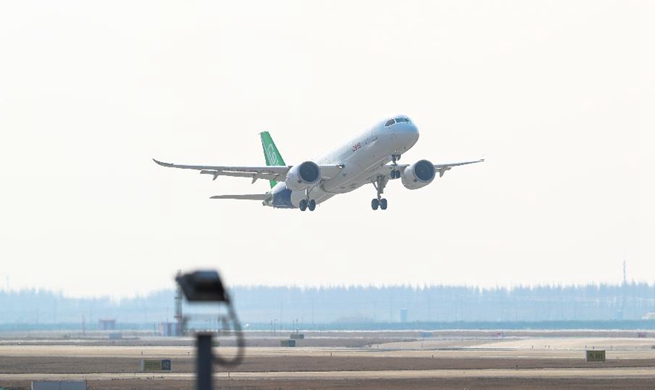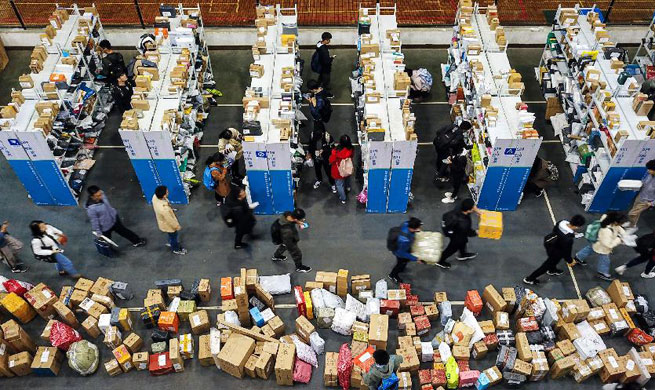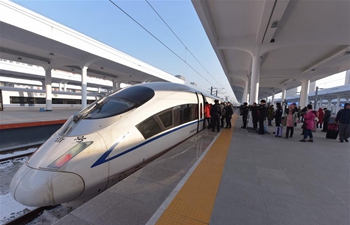by Raimundo Urrechaga
HAVANA, Dec. 28 (Xinhua) -- After a 1.2 percent economic growth this year, Cuba seeks to increase its efficiency and exports to reach greater development in 2019, amid financial tensions due to cash constraints and reinforced U.S. sanctions.
COMMENDABLE GROWTH
Although well below the expected 2 percent growth in the country's GDP, the figure is "commendable," according to Cuban government officials, after two years of very low growth and recession.
"It's an encouraging figure as the economy continues to recover within an adverse scenario," Cuban President Miguel Diaz-Canel said recently at the closing ceremony of the country's parliament session.
Economic losses amounting to 13 billion U.S. dollars, due to hurricane Irma last year and the rains associated with tropical storm Alberto in mid-2018, harshly impacted the country's monetary plan.
Other negative elements included a shortage in hard currencies to pay foreign debts, Cuba's Minister of Economy and Planning Alejandro Gil told lawmakers.
Gil said the Caribbean nation is working on updating its economic model in a "complex scenario" marked by a setback in relations with the United States and "financial persecution" by Washington as it continues its six-decade old embargo.
The blockade causes an annual financial loss of 4.3 billion dollars, he said. "Our country would be able to grow much more if the United States lifts the blockade," he added.
CHALLENGES AHEAD
Key challenges for Cuba in the year ahead include drawing more foreign investments, increasing exports of its signature products and medical services, attracting more tourists and boosting efficiency in state-owned companies and factories, experts have said.
Accelerating the nation's investment rate, which currently is around 11 percent of the GDP, must be done next year in order to guarantee "dynamic and sustainable" development, Rodrigo Malmierca, minister of foreign trade and investment, said recently.
"Increasing foreign investment in Cuba is an essential factor to our economic growth as the country needs around 2 billion dollars a year of external capital to reach an investment rate of 20 percent of our GDP," Malmierca said.
Malmierca added that this year, 40 new joint or foreign projects were authorized for over 1.5 billion dollars.
"Since the approval of the new foreign investment law in 2014, around 5.5 billion U.S. dollars have been committed in different industries, particularly in the Mariel Special Development Zone," he said.
In terms of tourism, Cuba will close out this year with a new record in the arrival of international tourists reaching 4.75 million, a 1.3 percent increase from 2017, a senior official from the island's Ministry of Tourism (MINTUR) said at a press conference on Dec. 20.
"Canada continues to be the country's first market despite a 2 percent drop in arrivals of tourists, while the U.S. comes in second marked by the increase of cruise ships from that nation," said Michel Bernal, MINTUR's development director.
Traditional markets like France, Germany, Spain, the U.K. and Italy declined in arrivals, while Russia became the most dynamic source country with a 30 percent rise in comparison to 2017.
The number of tourists from Mexico and Brazil grew 23 and 16 percent respectively while the number of Chinese visitors increased 10 percent from last year, Bernal said.
PRIVATE SECTOR
A complementary aspect of the Cuban economy which becomes more important each year is the island's nascent private sector, which contributes around 13 percent of the island's annual budget.
Almost 600,000 Cubans, or 13 percent of the country's labor force, work in the private sector, according to the state daily Granma.
The Cuban government announced in July a package of new measures which aimed to address problems such as the black market, tax evasion and wealth inequality that have long haunted the country's private sector.
The measures, coming into effect in early December, included reducing the number of business categories from 96 to 28, and that of the work-related activities from 201 to 123.
"Private workers are not enemies of the revolution, they have emerged as a result of an update to our economic model, solving problems that represented a burden for the government," said Diaz-Canel at the conclusion of the parliament session.
This was the first major reform-oriented move taken by Diaz-Canel after his election in April.
A 1.5 percent GDP growth is forecasted for 2019, Diaz-Canel said, as Cuba seeks to slightly develop in areas like infrastructures, industries, sugar production and tourism, and reduce its foreign debts.













